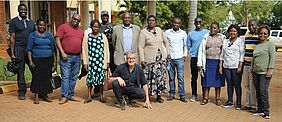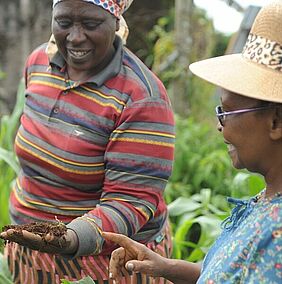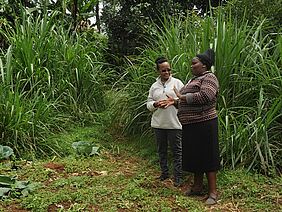The projects SysCom (Farming Systems Comparisons Trials in the Tropics), ProEcoAfrica (Productivity, Profitability and Sustainability of Organic and Conventional Farming Systems in Sub-Saharan Africa: Comparative analyses) and OFSA (Organic Food Systems Africa) have enhanced the scientific evidence about the performance of organic agriculture in comparison to conventional agriculture in the tropics. Based on these insights, a policy brief with a focus on advancing organic agriculture in Africa was developed in collaboration with the GIZ project, Knowledge Centre for Organic Agriculture (KCOA). The KCOA project works towards closing knowledge gaps to promote food systems that create food security and respect the Earth’s environmental limits. The project has established five knowledge hubs, implemented across Africa.
Policy brief – one part in a series
The policy brief and corresponding video explain the state of scientific evidence and provide political recommendations based on the lessons learnt from FiBL’s farming systems research pursuant to the goals of sustainable development. The topics covered and policy recommendations provided are relevant to agricultural policies at the national and regional level, as well as actors in specific commodities and sectors, organic value chains, and standards.
The policy brief is one part of a training material series, which utilises diverse formats to reach different target audiences: farmers, advisors, trainers, students, policymakers, and more. The series covers six topics: the ecological organic approach, pest and disease management, soil fertility and health, productivity, profitability and biodiversity and climate change adaptation. For more details on the other materials in the series, see the related news item (linked below).
The series is made available for download in the FiBL Shop, the Organic Africa Website, YouTube and on Organic Eprints. They will also be made available via the knowledge platform developed within the sphere of the KCOA project.
There is substantial evidence illustrating that the dominant agricultural systems feeding the growing population are not a sustainable option for the future. Global environmental and social challenges are especially pronounced on the African continent, and the adverse effects of climate change, biodiversity loss, and food and nutrition insecurity make a transition to ecological organic food systems imperative. Organic agriculture and agroecological approaches are gaining importance in Africa as they are supposed to enhance environmental health as well as nutrition security and well-being of both smallholder farmers and urban consumers by contributing to healthy, diversified diets.
Several studies conducted under temperate environments (mainly in Europe or Northern America) have established the benefits of organic farming over conventional farming. However, it has been questioned whether organic agriculture can contribute to sustainable development in tropical conditions. The ongoing FiBL project SysCom and the finished projects ProEcoAfrica and OFSA aim/aimed to fill this knowledge gap by working closely with farmers to design and undertake research in Ghana, Kenya, Uganda, India and Bolivia. More information about these projects can be found in the project brief ‘SysCom and ProEcoAfrica/OFSA projects’ (see link below).
Further information
Contact
Links and Download
FiBL shop
- fibl.org: Policy brief "Advancing ecological organic agriculture in Africa"
- fibl.org: Flyer "SysCom and ProEcoAfrica/OFSA projects"
FiBL project database
- fibl.org: Project description "Knowledge Centers Organic Agriculture for Africa (KCOA)"
- fibl.org: Project description "Long-term farming systems comparisons in the tropics (SysCom)"
- fibl.org: Project description "Productivity and Profitability of Organic and Conventional Farming Systems (ProEcoAfrica)"
- fibl.org: Project description "Organic Food Systems Africa (OFSA)"
Other links
- orgprints.org: Series of knowledge products
- youtube.com: KCOA educational video series
- youtube.com: Policy video (long version) – Advancing ecological organic agriculture in Africa
- youtube.com: Policy video (short version) – Advancing ecological organic agriculture in Africa
- giz.de: KCOA project - Organic agriculture: promoting knowledge exchange and networks






